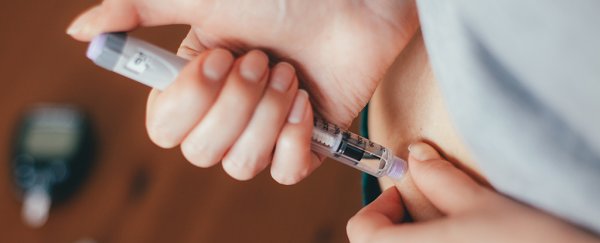Those living with diabetes often have to use daily injections of insulin to manage the body's glucose levels. But scientists are closer than ever to replacing those needle jabs with a simple insulin pill.
So far, the pills have shown to be incredibly promising in animal studies, and human trials will be on next. Having such an option could help transform millions of lives, so it's easy to get excited here.
The reason we can't simply take insulin in pill form is due to a series of biological barriers which stop the insulin from getting where it's needed - the blood. According to the researchers, their pill can handle this problem.
"Once ingested, insulin must navigate a challenging obstacle course before it can be effectively absorbed into the bloodstream," says one of the team, Samir Mitragotri from Harvard University in Massachusetts.
"Our approach is like a Swiss Army knife, where one pill has tools for addressing each of the obstacles that are encountered."
First, the pill must survive the acids inside the stomach, which it does by wearing a special polymer coating developed by the team.
The coating disintegrates in the more alkaline environment of the small intestine, at which point the ionic liquid holding the insulin is released: this protects the insulin from being broken down and thinned out by enzymes in the intestine.
This same liquid carrier – made up of choline and geranic acid – also helps the insulin pass more easily through the mucus lining the intestine, and the tight cell junctions of the intestinal wall.
In one experiment as part of the study, pills were given to six non-diabetic rats, while another three non-diabetic rats were given the traditional injections of insulin.
Blood glucose levels in the rats given injections dropped 49 percent in one hour, which is typical for this type of test. In the rats given pills, these levels dropped 38 percent in two hours, and 45 percent in 10 hours.
In other words, the tablets proved almost as effective as the injections. If these pills can get through human trials too, we're talking about a much easier mode of treatment for people with diabetes.
"Many people fail to adhere to [the injection] regimen due to pain, phobia of needles, and the interference with normal activities," says Mitragotri. "The consequences of the resulting poor glycemic control can lead to serious health complications."
Not only would an insulin pill be more convenient, it would also more closely match the way the body's pancreas produces insulin naturally.
And that's not even all: the liquid-borne insulin doesn't cost too much to produce on a large scale, is relatively easy to manufacture, and can be stored for up to two months at room temperature without any damage.
But before we get carried away, it bears remembering that more animal tests and some longer-term toxicology studies are going to be required. It's also not yet clear whether these pills have the capacity to provide the background levels of insulin required with type 1 diabetes, or the larger doses of insulin required with type 2 diabetes.
For now though, the new delivery method is showing itself to be adept at jumping over the hurdles that have tripped up previous attempts to create an insulin pill – something many scientists are keenly working on.
Mark Prausnitz from the Georgia Institute of Technology, who wasn't involved in the latest study, thinks that its results are very promising.
"It has been the holy grail of drug delivery to develop ways to give protein and peptide drugs like insulin by mouth, instead of injection," says Prausnitz. "This study shows remarkable results where insulin given by mouth in combination with an ionic liquid works about as well as a conventional injection."
"The implications of this work to medicine could be huge, if the findings can be translated into pills that safely and effectively administer insulin and other peptide drugs to humans."
The research has been published in PNAS.
